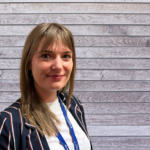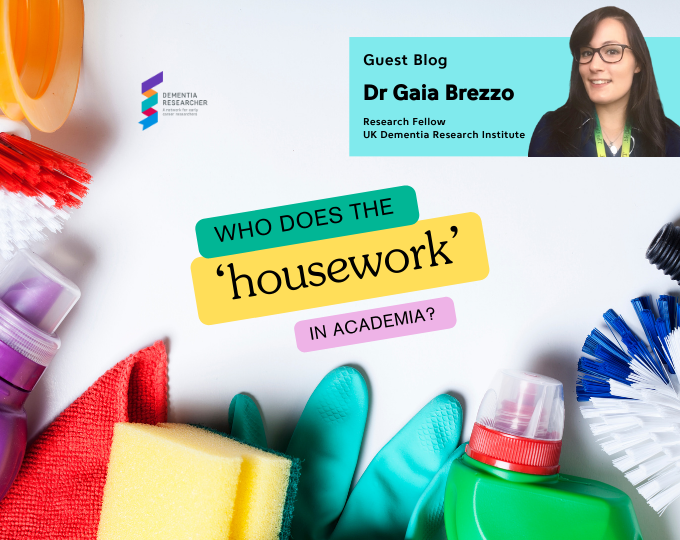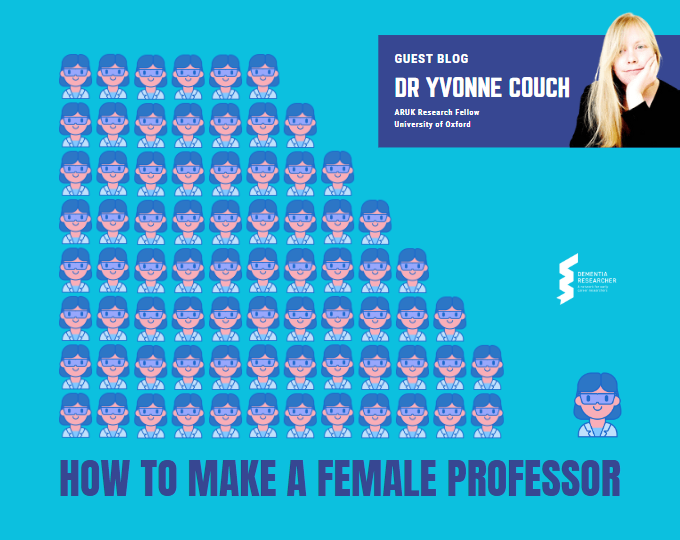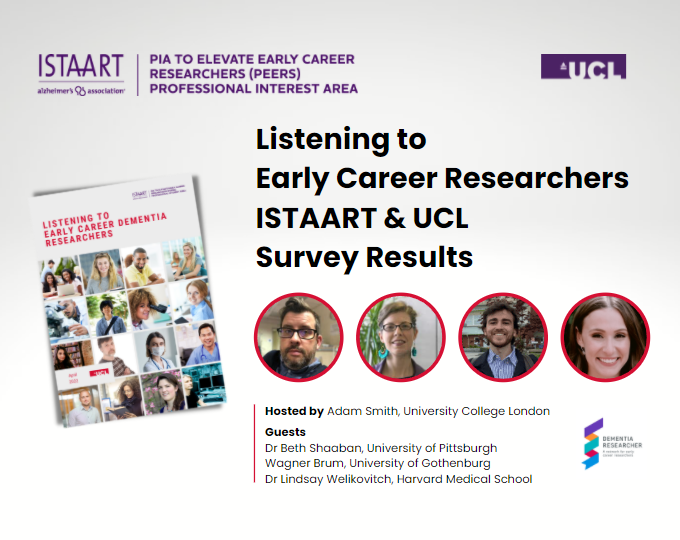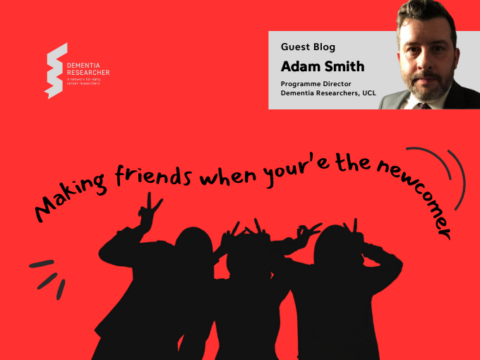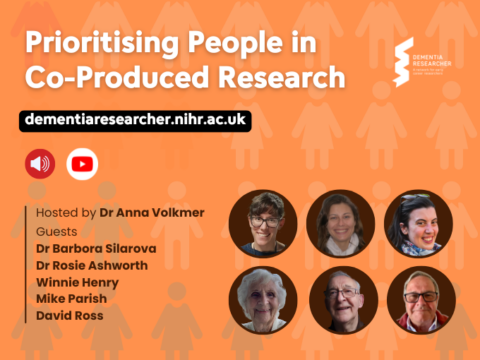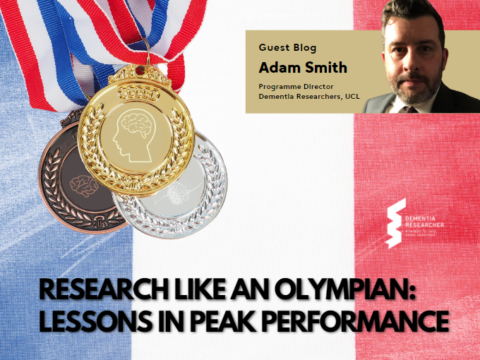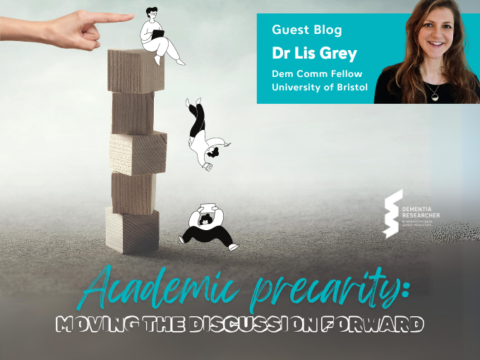In this episode of the Dementia Researcher Podcast, we discuss the challenges and support needs of early career dementia researchers (ECRs) across Europe. Our discussion centres on a recent study titled Supporting Early Career Dementia Researchers: Identifying Support Needs and Ways Forward via a European Study. The study sheds light on the unique difficulties faced by ECRs and offers practical recommendations to enhance professional journeys.
Speakers:
- Adam Smith: Programme Director for Dementia Researcher and today's guest host.
- Dr Charlèss Dupont: A postdoctoral researcher at Freie University in Brussels with a background in nursing and communication. Charlès's work primarily focuses on communication and palliative care in dementia.
- Dr Pascale Heins: With a background in occupational therapy, Dr. Heins works at Maastricht University, where her research explores ways to support social life in people with dementia (Watch Pascale defend her PhD thesis)
- Dr Sara Laureen Bartles: A postdoctoral researcher at Karolinska Institutet in Stockholm and Maastricht University, Sarah's research spans chronic conditions management, including dementia.
Key Takeaways:
- Funding and Career Support: The study identifies a significant need for better financial support mechanisms, particularly in the transition from PhD to postdoctoral roles.
- Work-Life Balance: The pressures of academia often lead to an unhealthy work-life balance, with expectations set by supervisors. The study calls for more proactive support from institutions.
- Mentoring and Training: The importance of mentoring and training, both within academia and for careers outside of it, is emphasised as a way to better prepare researchers for diverse career paths.
- Dissemination: There is a need for improved dissemination strategies, ensuring that research findings reach a broader audience, including those directly affected by dementia.
Tune-in as we explore these critical issues and discuss actionable solutions to support the current and next generation of dementia researchers.
Voice Over:
The Dementia Researcher Podcast. Talking careers, research, conference highlights, and so much more.
Adam Smith:
Hello and thank you for tuning in. Today we're going to hear from three of the authors behind a paper titled, Supporting Early Career Dementia Researchers, Identifying Support Needs and Ways Forward via a European Study. As regular listeners will know, we're all about supporting researchers, listening to what's wrong with the system and what you need. So, I hope you're as excited as I am to hear what about our guests work.
Hello, I'm Adam Smith. I'm the programme director for Dementia Researcher, and it's my pleasure to be guest hosting this show. I've said this before and I'll say it again. Early career researchers are the fuel that drives discovery and dementia research. You are essential when it comes to finding ways to prevent dementia, understand and diagnose a disease, better care for people and treat people living with it. It may be professors delivering those keynote talks at conferences, but the poster halls are full of early career researchers work. Therefore, it's incredibly important to ensure that we have a healthy pipeline of people wanting to come into the field and that institutions and funders are adapting and constantly striving to improve their career opportunities, lives, and well-being, most importantly, to ensure that we keep them.
Today, I'm joined by Charlèss Dupont, Pascale Heins and Dr. Sara Laureen Bartles, who as an aside to their day jobs, share our passion for supporting early career researcher careers, and they've made it their business to work on understanding ECR challenges and supporting their communities. And here they are. Hello everybody.
Dr Sara Laureen Bartles:
Hi, Adam.
Dr Pascale Heins:
Hi.
Dr Charlèss Dupont:
Hi.
Adam Smith:
Thank you so much for joining us. Let's do some proper introductions. Charlèss. Charlèss, why don't you go first?
Dr Charlèss Dupont:
Yes, thank you so much, Adam. Indeed. I'm Charlèss Dupont. I have a background in nursing and communication. I work at the Freie University at Brussels, that's in Belgium, and I'm their postdoctoral researcher working mostly around communication and palliative care in dementia. Been here now almost for seven years, I think.
Adam Smith:
Fantastic. And I'm really sorry I didn't credit you. We've been Dr. Charlèss at the start. That's because last time you were on the podcast you were still doing your PhD.
Dr Charlèss Dupont:
Yes, but that's ages ago.
Adam Smith:
It is.
Dr Charlèss Dupont:
You also have to congratulate Pascale; I think.
Adam Smith:
Pascale as well. I'm so sorry.
Dr Pascale Heins:
Not yet.
Dr Charlèss Dupont:
Sorry.
Adam Smith:
Well, we'll be sure to update your bio. But congratulations on getting through that and on finding a postdoc job as well.
Dr Charlèss Dupont:
Thank you so much.
Adam Smith:
Pascale, why don't you go next?
Dr Pascale Heins:
Yes, hi. Thanks for having me. Yes, my name is Pascale Heins. I have a background in occupational therapy, and I am working in the Netherlands at Maastricht University, and my PhD research was on how to better support people with dementia in their social life. And yes, my PhD defence is right around the corner, so in two weeks. And right now, I am doing postdoctoral work still in Maastricht University.
Adam Smith:
You're not one of those universities where they... Because I've seen this particularly from European institutions where they live stream your defence.
Dr Pascale Heins:
Yes, they do that.
Adam Smith:
Are you at one of those places?
Dr Pascale Heins:
Yes, I am.
Adam Smith:
How do you feel about that?
Dr Pascale Heins:
Well, I'm feeling all right because I don't see the people being online, so that's okay.
Adam Smith:
Charlèss and Sara, are you going to be watching?
Dr Sara Laureen Bartles:
Of course. It's already in my calendar and I also requested a copy of her book. So yes, I want to see it all.
Adam Smith:
So, no pressure. I'd love to hear what listeners think about live-streamed defences. Because It's not common practise in the UK. I don't know. Do we know if they do it in the US? I don't think they do, do they? It's a very European thing. Anyway, good luck. If you send us a link, we can tweet that and get you even more people to come and watch if you like.
Dr Pascale Heins:
Wow. Not sure about that.
Adam Smith:
Are they recorded as well?
Dr Pascale Heins:
Yes, they are.
Adam Smith:
So, what we can do is because we're recording this... I should add, we're recording this podcast at the end of February. And it's probably been quite a few weeks since from us recording to you listening. By which time, your defences will already have happened. So, we could include a link to the recording. So, if anybody's interested in finding out more about Pascale's PhD work, click the link on the right-hand side if you're watching on our website or the link below, if you are watching on YouTube or in your podcast app. Great. No pressure. If there isn't a link there, it's because after we recorded, she said, "Don't do that. I don't want a link there." And that's why. And I'll be entirely apologetic. Sara, your turn?
Dr Sara Laureen Bartles:
Yes, hi. Hi Adam. Nice to be back as well. It's been a couple of years since we've talked in your podcast. My name is Sara Laureen Bartles. I'm originally from Germany and I have a background in neuropsychology. And currently I'm actually based in Stockholm, Sweden working part-time for Karolinska Institutet. And I'm also seconded part-time to work remotely from Maastricht University. So, Pascale is a colleague of mine at the Alzheimer's Centre, Limburg in the south of the Netherlands. I'm now in the fourth year of my postdoc. I really enjoy being a postdoc and I'm going to continue with some more postdoc work after the summer.
And my research focuses on understanding and supporting people with chronic and long-term conditions including dementia and chronic pain, and relevant others in managing everyday life through digital innovations. And as you said, a sideline of our work is also the support for early career researchers. So, I've been the European lead of ISTAART, PEERs PIA. ISTAART is the American Association for Dementia Research, and they have professional interest areas PIAs and one of them focuses on supporting or elevating early career researchers, PIAs. So, we love these acronyms in dementia research, right? And I'm also an academic board member of INTERDEM, which is a European network for psychosocial research. So that's me.
Adam Smith:
That's a lot. You're terribly busy. You’ve just got extra time. Do you want to come and write blogs for us as well because we're always looking for extra contributors.
Dr Sara Laureen Bartles:
Maybe in the future at some point. Yes.
Adam Smith:
I'm glad you mentioned ISTAART because of course ISTAART is what brought you and I together when we met for the first time a while ago. And it's a brilliant organisation. And the PIA to Elevate early career researchers does have these continental working groups that are looking at these issues. Because we recognise that what we're going to talk about today is particularly relevant to European researchers, but of course it's going to be different challenges if you're in Australia or Africa or South America or other parts of the world. So, we should apologise now. Of course, this show, I know many of you listening won't necessarily be in the European Union, but I'm sure that some of the issues we're going to touch on today are going to be universal no matter where you are. And do have a look at ISTAART. We'll put a link again in the show notes if you want to get involved with some of those working groups.
Thank you very much. That's the introductions out of the way. So, let's get on with the show. So, as I mentioned at the start, today we're going to talk about your study, which looked at how early career researchers from across Europe are supported. Charlèss, I come to you first and ask you to share your inspiration behind this study and its significance in the current research landscape.
Dr Charlèss Dupont:
Just like Sara, I'm as well a board member of the INTERDEM Academy, and the in INTERDEM Academy tries to support early career researchers in psychosocial domain and dementia within their careers. So, talking within this board, with the other members, we were thinking about how can we support the members of the INTERDEM Academy and what do they need? So that's I think, but Sara jump in to correct me there. How the idea started a little bit. And because Sara is with us as well on the board, we started to think like how can we make this broader? And that's how ISTAART came in PEERs PIA and that's I think how we started our adventure.
Adam Smith:
I mean this is just from having that lived experience of being an early career researcher and the challenges that you faced. And listening to colleagues and your peers around you about their challenges. Did you have any particular issues that you thought were going to inspired this? Were there some particular challenges for you personally that made you want to look at careers?
Dr Charlèss Dupont:
Yes, so I think one of the challenges I experienced that at the moment and some of my colleagues as well who were working on the paper was the financial part of going from your PhD into a postdoc. So, we were talking about this during Alzheimer Europe, one of the conferences. So, this is one of the things we saw. This cannot be a thing that I only have or the small group of people we're talking with. So, we started also from there. Because it's exceedingly difficult to go from into your PhD to a postdoc if you want to secure your own funding without applying to another job.
Adam Smith:
That's a good enough reason. And I think anybody who works in this space, particularly those who are more active on social media, I think are more aware particularly of the chatter there is about challenges in academic culture in their careers. And I think if you're listening to this and you're not a social media person, I can understand how you might be less aware that there's a whole online thing about the problems with pressure from peer reviewers about short-term contracts, about pipeline and the number of postdoc jobs available and long hours culture.
These are all things that are talked about. But the problem is that we just assume that they're relevant everywhere and you need research like this to get to the real bottom of understanding whether those are universal. Thank you Charlèss. Pascale, can I come to you next? I can understand you why you wanted to do it. Personal challenges, want to support UCR careers. And of course, we can't support them if we don't really know what the problems are. So, what were some of the key findings regarding the needs and challenges faced by early career researchers?
Dr Pascale Heins:
Well, we saw actually what also Charlèss just talked about, that one critical aspect was the need for additional support in funding generation and also the financial aspects of being a researcher. Like you said, the short-term contracts, but also that need for transitional funding in between different contracts. Thank you. Especially for postdoctoral researchers, but also that ECDs are lacking guidance in the practical application of research methods. But also stood out that many early co-researchers also prioritise support and dissemination, for example, through social media, through other channels. So, using social media to disseminate your own research findings and also using other channels, for example, reaching out to other audiences in our terms like people living with dementia and also the significant others.
Adam Smith:
So, how did this study work? This was a survey, was it? Or a questionnaire of some kind of interviews. What did you do?
Dr Pascale Heins:
Well, it was a combination of different things. We started up with a survey that was filled in by sixty-five early career researchers across Europe. And afterwards organised two different workshops. And one at an Alzheimer Europe conference and one online workshop where we asked early career researchers what things are actually where you need more support and what are your ideas and how we can get there.
Adam Smith:
So that's good, isn't it? Because it shows you didn't have any preconceptions. I know I've been in this space for so long now, I have these kind of preconceptions about what the problems are. And I think by having those discussions rather than just relying on a survey, you can actually give people a chance to tell you. Because I think sometimes, we're a little bit surprised. I know I have been assuming that something is a big issue because I've read about it as you say, on social media or other places. And then actually when you talk to people you suddenly go, "Oh I didn't realise that was an issue.?
A particular example of that was in South America. The results from our big ECR peer survey in South America showed that there weren't too many concerns about contract length. And I was like, "Oh really?" And that's because so many people actually the way they did contracts there was different. However, everybody was still concerned about funding because you still had to apply funding. There were fewer funding bodies. Where do people get their funding from in Europe? Who are the big dementia research funders? Is it liking the UK where charities and government or are there other places to go?
Dr Pascale Heins:
Yes, good question. It depends on the country, actually what kind of funding opportunities there are. But they are governmental but also non-governmental funding bodies in Europe, really depends per country.
Adam Smith:
Great. Sara, thank you. You've being so patient. So, I've read the paper. Again, anybody wants to read this, there'll be a link in the show notes and to the right-hand side, if you're watching on our website. Your study outlines six recommendations for better supporting ECRs. Can you take us through them and which you think is most critical?
Dr Sara Laureen Bartles:
Yes, it's actually nine recommendations, Adam, not six. You missed [inaudible 00:15:29].
Adam Smith:
I apologise.
Dr Sara Laureen Bartles:
So, for everybody who is curious, the full list is in table four of our article and I'm not going to talk you through all nine of them now. That will maybe be a bit much. But so, we structured the recommendations, and these recommendations were derived through these group discussions with early career researchers. So that wasn't really us proposing recommendations, but this is a result of the paper. And they are grouped into four different main categories. Funding and career support, social well-being, mentoring and training and dissemination. And we also specify who these recommendations are for. So, who should listen to this recommendation? Is it a support organisation such as ISTAART or INTERDEM? Is it a funding body or is it a university that can do something about this recommendation? So, one example is ECRs need clear and centralised overviews of available research funding opportunities ideally grouped by a research area and also by career stage.
So, if you're a PhD student, you can apply for this kind of funding. If you are a third-year postdoc, you can apply for this kind of funding when you are based in a certain country. So, this European overview is currently lacking. I know dementia researcher UK has great funding opportunities and shares a lot of information, but that is UK based. KI for example, Karolinska Institute, has a good website on their university with structured information. But those are examples of where you can find information. And there is something more European-wide lacking. It is something that we are discussing at INTERDEM now because there's an INTERDEM website. So that could be one way of centralising information and really disseminating that to early career researchers. So that's one of the recommendations. Should I just go on to the next one or is there-
Adam Smith:
Well, just to comment on that. So, you're right, dementia researchers have brought those together. It's incredibly hard. I think we've made dementia researcher in a way that anybody can come in and add funding calls to the website and we made efforts, lots of efforts over the years to try and talk to funders to say, could you go out of your way to come to our website and add your funding listing here? And if you do that, it'll go out in our newsletter every week, which goes to over three thousand, nearly 4,000 people will promote it. We want to encourage uptake. Do you know how many funders have actually added funding calls to our website? None. None of them have ever done it. The only way that they get added is by our... We sign up to a lot of mailing lists and if we get emails through, we'll add them.
But there are so many, as you say, when you consider every European country has its own funding calls, trying to find out about them to put them on our website is really tricky. I'm not also convinced that every funder, and apologies to any funders listening here, you can completely disagree with me on comments and call me out. But there's also a balance about how far you promote this. Because funders are very keen to say that they might fund say one in six applications or one in five or one in four, however many they fund. And of course, the more applications they get, the more work there is in reviewing. I know some funders would say, well no, but if we get more applications that means we can then go back to the powers that be and ask for more money to show that we have. But I'm not convinced that every funder beyond putting it on their website and then keeping quiet and waiting for people to find it, actually wants to encourage dozens and dozens of applications. Tell me, I don't know.
Dr Sara Laureen Bartles:
It's a good point. Of course, there is a processing at the other side if more people apply. But if you are an early career researcher aiming to get a postdoc experience abroad and you don't know, where do I find funding in Switzerland for example, where do I go as a dementia researcher? So that's kind of from a, yes, we want mobility across Europe. We want exchange of knowledge and that needs to be centralised, information needs to flow in all directions, not just to the people that are convenient to the funding body. So, I think I would then say, okay, you need to improve your system too.
Adam Smith:
Absolutely. And to qualify that, I don't think that's necessarily the case for every funding call. I think even within a particular funder, we know that there's quite low uptake on clinical fellowships. For example, anything aimed at jobbing healthcare professionals doesn't have the same kind of uptake. Whereas postdoc fellowships, there are lots and lots of applications for those. And so, it's probably specific funding calls that they need to promote more than others. But anybody listening who's a funder or is aware of a funding call, do come to our website, add it. We're not just UK. If we haven't got European calls on there, it's because we simply didn't know about them. But when we find out about them, we do add them as well. And of course, people in Europe can come and work in the UK, you can come, so do look anyway just for the course. And funders like Alzheimer's Association, of course fund internationally and you'll always find their funding calls on our website. So come on Sara, what came next?
Dr Sara Laureen Bartles:
Yes. Then on social wellbeing, another recommendation that is specific for universities as well to take a new approach to emphasising mental health and well-being including a more straightforward track for a sustainable family friendly career. So often it is still women who take time off if children are on the way, that is just still the case across Europe. And then questions like, who is supervising my PhD student while I'm on maternity leave come up? Is it warranted for that person to join as a co-researcher or co-supervisor even on the team? How is the project going to be supported? And a short-term contract doesn't really help. Some of them can be extended based on your maternity leave, but some cannot. That is also a fact.
So there the universities are urged to reconsider their career opportunities, especially with the focus on family. And to that, I would like to also highlight a paper that recently came out, A call for action from Sarah Janus and Gili Yaron, Reframing Motherhood and Dementia Researchers. A Call for Action. So, if you are interested in that topic, it is published in Alzheimer's and Dementia and kind of builds on our recommendation as a very timely call for the society dementia research. Yep.
Adam Smith:
Perfect. And I should add, if you are listening to this now, we also published a podcast a little while ago called Careers and Cradles. Where we have three researchers who are either pregnant right now and on their first or second child or had just had their babies. And talking about what it was like to work during pregnancy, how they managed to plan to take maternity leave. Fortunate enough in the UK that we have rules that allow them to. I know in the other countries you can't even get paid maternity leave and then read the challenges of returning to work. So, I'm going to include, if you are listening, we'll include a link to that paper in the show notes and go back and listen to career and Cradles to hear about that topic as well. It is an important one. Are all the rules same across Europe when it comes to maternity leave and things?
Dr Sara Laureen Bartles:
No big differences across Europe, certainly also if the father can take some of the maternity days or not, that depends on the country and how much payment you become, if the university increases that or if there is paid leave at all. So obviously we can't change the whole system, but still, this is a call for action for the universities to just critically look at their current strategies and see is there any room for improvement because this is certainly an issue and especially for women or young parents.
Adam Smith:
And I guess in particular in dementia, which has been really successful in attracting more women to come and work in this field over the last 5, 10 years, that it's becoming more of an issue now than we perhaps would've recognised before. Which is really, I can understand why it made its way into this survey. Thank you. So important points. What was next?
Dr Sara Laureen Bartles:
I have two more points for you. So, mentoring and training, I would like to highlight one. To provide more training and experience also in employment outside of academia. So often we are, as academics, trained to stay in academia and obviously we want that, we're trained and retain. However, it should also be encouraged to look outside of academia and what transferable skills do you have? How can you sell yourself to non-academic employers? How do you brand yourself and only a minority of people get current training on that look outside of academia. And therefore, we would encourage both support organisations and also universities to offer training that allows early career researchers to profile themselves to any kind of field they would like to work in.
Adam Smith:
Is this just your cunning way of getting rid of the competition?
Dr Sara Laureen Bartles:
We'll see. We're working.
Adam Smith:
It's easy. I have slightly mixed views on this actually because we've also published lots of blogs. We've talked about this, about how your PhD training provides you with a whole plethora of skills you might not realise that are entirely transferable to other fields, and it's a training post and you should do this. But also as well, part of me thinks we should be doing absolutely everything we can to keep people. Because we need more people in dementia research not to actually provide them with a way to leave. So, I think there's a balance to be struck. I think actually ideally, we'd like lots of nice postdoc jobs, make it a great environment to be in that actual people don't feel like they want to leave. But as you say, then also make sure that they've got everything they need should they want to leave.
Dr Sara Laureen Bartles:
Yes, or combine it. Maybe you can combine your research with clinical work or how do you do that? How do you combine your work with consultancy if you are interested in making a bit more money? Because some of the reasons that people are leaving is the financial aspect. And how can you combine that with consultancy work or with self-employment with entrepreneurial ideas that you might have. So, I agree. I'd love to for all of the early career researchers to stay in academia. But if you have additional ideas, we should also support those individual trainings.
Adam Smith:
Absolutely. And so many actually of people who do leave dementia research, it's not that they go wandering off to an entirely different... They don't suddenly go off and become a banker or suddenly go off and become a... They tend to stay in the field, don't they? These kind of research communication work or industry or somehow in marketing go to work for charities or funding bodies and things like that. We do see people go. So important. And if anybody's listening who would like to come and do a talk for dementia researcher, we're going to be launching the dementia researcher community’s app in April, advert time for a plug, which will include... It's either going to be a weekly or fortnightly careers online seminar every week. And of course, that's going to be an important topic to add to that list.
Dr Sara Laureen Bartles:
Yes, last recommendation that I want to highlight is dissemination. So, it is very helpful for early career researchers to have a template and information how to create a dissemination plan, and how to use communications to disseminate findings or recruit people. Talk with lay audiences for example. And I think Adam, you have just the reference or just the resource for early career researchers as you just recorded your communications plan workshop that you gave training. So that is one resource that can be used. And currently it's a lot of learning by doing when it comes to disseminating findings and doing communication plans, there's not a lot of top-down structures. So again, a call for support organisations, funding bodies and universities to actually promote people in using communications to disseminate their findings for early career researchers, using social media, but also traditional ways. Of course.
Adam Smith:
I think your research, particularly the research field that the three of you work in, suffers from this more than others. Because all too often your research will discover an intervention or a new way of working, which your research found to be successful. And I would imagine that your passion then is to want to see that used as much as you can. And there's this fine line that is between just disseminating findings and moving on to what is your next piece of research. And actually, how long you cling to that and try to implement it and make it happen. Are any of you in that situation where you've discovered something and you're clinging to it and you're working hard to... You haven't let go, you haven't just said, yes, the paper's published next study.
Dr Charlèss Dupont:
I think it's also the efforts that Alzheimer, Europe, and the working group of people with dementia made to really vocalise. It's amazing the work you're doing, but it needs to reach the people. So, I think that's also part where the findings of our paper come from. From those advocacy groups of people of lived experiences to push us as researchers. Like a part of your research is being funded by public resources, so it also needs to stream back into the public, right? So, I really appreciate that part of our field, our research topic.
Adam Smith:
I feel like we could talk about this for hours.
Dr Charlèss Dupont:
Yes, [inaudible 00:29:51].
Adam Smith:
No, no, no. Because, I have so many views on this. I think there's this real challenge between, I think it's probably okay if you've spent your entire career working in a particular area or whether that's something like preventing people falling down the steps or becoming injured in the home when they're living with dementia. I can understand if you've spent your career on that, that you might cling to research findings and then do all you can to make sure that they find their way into practise in people's lives.
And that goes beyond just publishing the paper. It's kind of start innovating and starting companies. It's writing guidelines and tools. And you could spend the next five years lobbying commissioners and funders to try and get people to buy this or to use it. And then of course you seem to have more senior researchers who will treat it entirely like a study. Does this work? Yes, it does publish, right? Let's look for something else that see if something else works and then move on. And I'm drawn as to which I think is best. I don't know if there is a best, I don't know. What do you think?
Dr Pascale Heins:
Yeah, I'm really struggling with that as well. And that's why I'm actually now going back into clinical work as well. So, looking for the combination between research and clinical work because I have the feeling, okay, I'm doing all these studies, I'm finding all these things, but who is going to implement it in practise? So, I'm now the one in my clinical work implementing my own research. So yes, I'm really struggling sometimes to find ways to actually implement the things that you find in your research. And I think that's the most important thing because that's what I want to do, right? Help people with dementia live a better life.
Adam Smith:
Here's the question back to you. Whose job is it to do that? When you found something that works, whose job is it to actually make it happen? Where do you draw the line between dissemination and implementation? Was there any view on that? Pascale, Sara?
Dr Pascale Heins:
You always have to think about implementation of your research as a research. And maybe you're not the one implementing it in practise, but from the beginning on you should think about how to implement in later steps and who should be the one implementing it, and then maybe give it to someone else. But yes, I think you should always think about implementing your research findings.
Adam Smith:
And that's something universities can help with, isn't it? Because I think if you've got the training, you all meant, you mentioned there from the paper about being good at disseminating your findings, about making sure everything you publish is open access. And then I love this that's finding its way into practise more. It's that at the end product of a study isn't just a paper, it's a whole package of resources that even if you don't go on to be the person that implements that you can hand over to somebody who will to say, here's all the tools, all the kit you need to actually make that happen.
Dr Sara Laureen Bartles:
Just to add to that, because it's a very important topic, it's actually really a research field in itself. How to do research in a way that it will find long-term implementation, that it will be long-term use. It depends of course on the research question on the topic itself, but ideally you work with all stakeholders from the start. You think about implementation from the start. You have the people with dementia, the healthcare professional, the manager, the IT developer, whoever is relevant for your project involved from the start because it's not just this handing over won't often work.
People might still not understand what they're supposed to do with it, but if they invest it from the start, then there's a higher chance for it to actually stick. And then when you are done with your research, it just lives by itself. But that is still, I think, a big challenge for a lot of psychosocial researchers that we do research for the gain of knowledge, and not always with the long-term implementation strategy in mind yet. But there's a shift in our field. I would say that more and more researchers really think about implementation and what happens when my funding runs out.
Adam Smith:
That's a really good point. I completely agree, and it is probably a little bit disheartening and frustrating as well that if you do these things and then find that they work and then you must hit yourself over the head constantly to go, why aren't you doing this thing? I discovered this will make people's lives better. Go ahead and do it. Anyway, let's move on. Charlèss, we've got a few more questions and I know we're already at about half an hour in. Were there any unexpected insights, or challenges you encountered along the way in making a study happen?
Dr Charlèss Dupont:
I think interesting with regards to the results. I for example, found... So, during the workshops of course we talked about what are the problems, what are difficulties, but also what do you think are possible solutions? So, we didn't only try to identify problems but also possible solutions like Sara said. And one of the things that I found very interesting that many of the participants said was that actually the work-life balance is very difficult next to the fact that having a family but also working extra hours trying to build up your CV, and that the need doesn't always comes from the researcher PhD researcher itself, but the experience, actually how you work and how much you should work is set by the supervisor.
Because people see that the supervisor is still writing emails during midnight or past midnight and then there's some kind of expectancy that you as a PhD researcher needs to do that as well to be as successful and to become a postdoctoral researcher or to become a professor. So, that was very interesting. Because I didn't have that experience at all. My supervisor has a very healthy work-life balance. She would point me out if I would write emails at midnight. So that for me was quite interesting to find that many of our participants felt this.
Adam Smith:
It's pervasive, isn't it? This long hour’s culture that we talk about and leading by example. And it comes up all too often that we say this, you've got to take time out, the well-being. And I think it's easy for us to talk about that in a podcast, but if you are in a lab somewhere or you're working in a clinic or somewhere you are, and those leaders have those expectations and I think even if they don't articulate them, there's ways that certain supervisors do things that make you feel obliged to work those kind of hours and to do that kind of thing.
Dr Charlèss Dupont:
Exactly, yes.
Adam Smith:
And if you don't, what impact will that have? If you are experiencing that problem, we do have some blogs and resources as well on the website that talk to... Because this is one of the training needs that comes out of that. Is we can talk about this to try and change culture and influence supervisors, but I think also as well just providing very practical guidance. Not, oh, you should do this. Or something that's high-minded but hard to do, but actually practical about how to deal with those challenging people we come across. And we've got some stuff on that.
Dr Charlèss Dupont:
And I think it's very good that we have these kind of things published now. Because often I don't think it's the attention of the supervisor to set this example, it's just how they grow into it, how they try to manage their workload and by reading our findings, they maybe become self-conscious about what they're doing.
Adam Smith:
Absolutely. Those soft levers of constantly influencing and talking about this today. Anybody who's listening who's a supervisor listening today, take note when you go back to work tomorrow. Pascale, can I come to you next? So actually, this touches us on our prior topic about implementation. So, have you had a chance yet to share your results with any organisations or funding bodies, universities that could actually do some of the things you'd like to happen?
Dr Pascale Heins:
Yes, that's a really good question because of course that's what we want. It's a call to action. We are very happy that it's published, but now there needs some steps to be taken. And yes, of course we're working on that. It has been presented also at the Alzheimer's conference, where also funding bodies, for example, are of course attending. And I think one of the great examples of what can come from this kind of work is that the incident network that Sara already mentioned, started up a mentoring programme where they match mentees together with mentors from the more senior people that help early career researchers in their career progression and really on a individual base, what are the things you need or what are the things you're struggling with right now and how can I help you with that? So, I think that's one of the greatest examples of what comes from this work.
Adam Smith:
That's great. Already stuff happening.
Dr Pascale Heins:
Yes.
Adam Smith:
And again, I'll need to remember to do all that. I've mentioned that there's going to be so many links. I'll forget all this. There'll be a link to INTERDEM inside. We certainly published an article recently about how you can become an INTERDEM member and what it's all about. That was a couple of weeks ago. And if you look back on the website sometime in mid-February, so do have a look at that. And Sara, what do you think established researchers and institutions, how can they contribute to making this a better environment based on what you've found?
Dr Sara Laureen Bartles:
Yeah, I think one thing that Shalina mentioned as well is being aware. So established researchers need to be aware of the struggles and of the challenges that early career researchers are facing and our article and this podcast and any kind of activity that is taken will increase this awareness. We had actually a publication award for this paper as well from INTERDEM. So that increased the amount of people that read it. Again, we had discussions under LinkedIn posts where also professors commented and said, oh, this is very interesting. This is very important. Thank you so much. So, this increased awareness is important.
And then secondly, I would ask or inspire researchers and institutions to be proactive, because a lot of the action is currently placed on the early career researchers. It is nice if your supervisors just come to you and say, "Hey, I know you can be in a challenging situation. What do you need? How can I help you?" So not always the early career researcher needs to ask for help, but it's sometimes also just nice to be offered help and offered support and be validated in your experience. So therefore, I think these two, be aware of the challenges and be proactive for your postdocs, for your PhD students. That's maybe my main takeaway or hope for the future for established researchers.
Adam Smith:
You've got me thinking as well actually that obviously I'm going to continue to bang on about dementia research being a great resource. Anybody who just listens and doesn't go to our website, go to our website, and have a look, because tonnes of stuff on there that talks to some of these topics and guidance and people who lived the experience, who've gone through some of these challenges that were mentioned in the report. But we don't get very many contributions from senior people. And I think we could probably go out of our way to try and encourage more senior people to share their experiences and to talk to how if they are good leaders, how they deliver these things or institutions.
I don't think I've ever had a blog written by somebody in an R&D or a career support role at a university. So, take away from me is to try and go away and get some of those good people. And if you're listening and you are one of those people, we're always looking for more contributors so get in touch. So, a question for all of you know I guess is, so you've got this paper, you mentioned at the start that you've got your ISTAART European working group, you're all in INTERDEM as well. What more are you doing? What next? Is there more research going on this right now?
Dr Charlèss Dupont:
Yes, of course. We are now wanting to look at what you mentioned as well, Adam. We made these recommendations. The early career researchers gave us suggestions of how the needs could be met. So, I think the next step for us is to reach out to organisations, universities and look at how can we provide support for you to do this? How can we take up action to really make those improvements to meet the needs of the career researchers? So, this is what we are doing now within INTERDEM, mostly together with the ISTAART. Yeah, but I think Sara, we also will work on some new surveys, right?
Adam Smith:
Well go on Sara. I know there's another paper in the pipeline.
Dr Sara Laureen Bartles:
So, we have one paper that's currently under review, which is a policy review. Pascale is involved in that and our colleagues from around the world from ISTAART PEERs PIA where we reviewed how top-down policies support early career researchers around the world, where is support and where support lacking. So that will be coming out. And also in the European working group, we look at mental health in early career researchers. That's a paper now which Brian E. Waters focuses on our leads in our working groups so that those are additional awareness pieces that will come out to look at additional aspects of the topic of early career dementia researchers. And maybe also to add, this survey is currently biassed, so there is way more women than men who filled this survey in. I don't remember. We didn't look at the gender distribution during the workshop sessions, but the survey is currently biassed.
So that can be because maybe more women are in this particular field in dementia care and social sciences. But it can also be that men are a little bit less likely to report needs and to fill in online surveys. There are studies on that. So, we need more gender diversity in our results. We also don't represent LGBTQ plus individuals in our survey at the moment. So, I think that's things that need to happen in the future to have a more generalizable view on Europe. Also including Southern and eastern European countries. They're also not fully represented in our survey. So just to highlight some limitations of our work as well.
Adam Smith:
Yes. And I can see how that's particularly important if you need to start looking at how you rank or prioritise some of these things as well. Thank you, Sara. Pascale, did you have anything to add to that? What do you think comes next?
Dr Pascale Heins:
Well, I actually don't have anything to add. These are the two most important points that I also wanted to point out.
Adam Smith:
I think so too. And of course we're all working together as well. But it's almost two years ago now, coming up to two years ago, we did a large international survey out of UCL with ISTAART as well to survey internet researchers, very comprehensively across the world to look at lots of things from career support to personal lives, to the work that they do, the fields they work in. And we are working on building a new version of that right now, which will come out definitely in 2024. Let's say that. That's not particularly ambitious. That's quite vague, isn't it? The autumn going into summer of 2024. So, we will be back on the podcast to encourage you to take that survey when it's available. So, let's just recap then. So, this paper's available, it's published on Alzheimer and dementia. It was published in November.
Dr Sara Laureen Bartles:
Yes.
Adam Smith:
November 2023. And so, there are nine recommendations which include better ways to pool knowledge on funding opportunities. I'm trying to remember this now. Improved opportunities for people who might leave work for caring or family responsibilities, support for how they might return, better opportunities for mentoring and addressing long hours cultures. I'm struggling now with the last few-
Dr Sara Laureen Bartles:
Dissemination.
Adam Smith:
Sorry.
Dr Sara Laureen Bartles:
Dissemination.
Adam Smith:
Dissemination. Yes, you absolutely spent time on that as well. Support to better train and enable somebody to be involved in dissemination of their work. What else? Go read the paper.
Dr Sara Laureen Bartles:
Exactly. There are five more that we didn't talk about now. So have a look at table four in our paper. That's a nice summary for you, which is quite comprehensive.
Adam Smith:
Thank you very much. Before we go, I just have one last question for which I’m going to put you all on the hook. So, for any researchers that are listening that might have experienced some of these issues we mentioned, whether that's kind of challenges with supervised supervision or working long hours or being a bit burnt out or they're about to come... Whatever it is. Are there any particular resources that you found helpful in your career that you'd like to point them to? Sara, you go first.
Dr Sara Laureen Bartles:
I would say be proactive and ask for support from the people around you. Talk to colleagues, talk to your supervisors if you have a relationship that supports that, of course. So yes, be proactive and tell people about your needs. That would be my main recommendation because people don't know what you need if you don't tell them. So do that.
Adam Smith:
Pascale?
Dr Pascale Heins:
Yes, it can also help just to talk about it with someone else and remembering that you're not alone in that situation and that a lot of other early career researchers feel the same. That's really helps me sometimes.
Adam Smith:
And Charlèss.
Dr Charlèss Dupont:
Remember, it's just work. I think that's especially important. And indeed, like Sara and Pascale, be honest about the things that you perceive and talk about it with peers, with your supervisor if possible. And now we have an interim mentoring programme, so that will be also an opportunity for you to discuss issues with someone else outside of your university.
Adam Smith:
Thank you very much. All great suggestions. I would've expected nothing less from three fantastic individuals that have gone... Well done for going so out of your way to address this. This may give you something nice to add to your narrative CV, but I know that this is all about how passionate you are about helping the wider community. And with people like you doing this work at this stage that you're at, I feel confident that we've got some amazing leadership in the future where so many of these things will go when you find your way to becoming the senior academics that I'm sure you all will. Thank you very much. I'm afraid that's all we have time for today. But if you just can't get enough of this topic, visit the Dementia Researcher website where you'll find a full transcript biographies on our guests, all the plethora of links we've mentioned throughout the discussion and other podcasts on this topic as well.
Of course, I should add that Dementia Researcher is here to help. We do publish all those things that I've talked about. And in April we will be launching the Dementia Researcher Communities app. The aim of this is to bring people together because we know that in addition to your own institution and your supervisors peer support can make all the difference. So do keep an eye on our website for updates of that. Download the app, join the communities. I really hope it's going to become a wonderful place where you'll get support and be able to talk openly and honestly about some of these issues and get some help that everybody might need.
Of course, if you are struggling with any of this, do also reach out. We're always willing to listen and signpost people to where they can get support if they'd rather do that in a more private way. I'd like to thank our fantastic guests, the incredible Charlèss Dupont, Pascale Heins, and Dr Sara Laureen Bartles. You've been brilliant. Thank you so much everybody for joining.
Dr Sara Laureen Bartles:
Thank you so much.
Dr Pascale Heins:
Thank you.
Dr Charlèss Dupont:
Thank you.
Adam Smith:
I'm Adam Smith and you've been listening to the Dementia Researcher podcast.
Voice Over:
The Dementia Researcher podcast was brought to you by University College London, with generous funding from the UK National Institute for Health Research, Alzheimer's Research UK, Alzheimer's Society, Alzheimer's Association, and Race Against Dementia. Please subscribe, leave us a review, and register on our website for full access to all our great resources. Dementiaresearcher.nihr.ac.uk.
Enjoyed the podcast? Please review, like, and share - and don't forget to subscribe to ensure you never miss an episode.
If you would like to share your own experiences or discuss your research in a blog or on a podcast, drop us a line to dementiaresearcher@ucl.ac.uk
Did you know... you can find our podcast in your favourite podcast app on mobile devices, and our narrated blogs are also available as a podcast.
This podcast is brought to you in association with the Alzheimer's Association, Alzheimer's Research UK, Race Against Dementia and Alzheimer's Society, who we thank for their ongoing support.
The views and opinions expressed by the host and guests in this podcast represent those of the guests and do not necessarily reflect those of UCL or Dementia Researcher

 Print This Post
Print This Post


